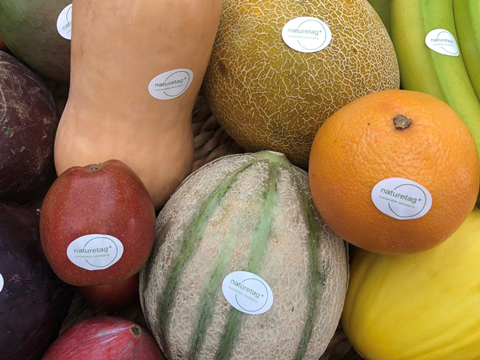
Gamma Supplies Ltd (GSL)’s certified paper-based, home-compostable, and biodegradable label is designed for direct contact with fresh produce; it is said to break down at the same rate as the food skins it is applied to without leaving toxins behind.
The naturetag label is intended for any fruit or vegetable skin; GSL lists its suitability for bananas, avocados, melons, cabbage, butternut squash, and celery, among other foods. However, it is said to be safe for direct contact with dry, moist, and fatty foodstuffs with a correction factor of at least 2 in line with Regulation (EU) No. 10/2011.
It has been independently certified by DIN CERTCO GmbH for home compostability according to the French NF T51-800:2015 standard. The label is said to completely degrade into useable compost within 365 days.
Taking the form of a sticker or tape wrap for bananas, it can be printed in any size, shape, or colour and is said to be plastic-free. It is set to be cost-effective compared to other labels on the market while offering a high-quality, food-safe solution; therefore, it is thought to benefit small-to-medium-sized grower-suppliers who apply produce labels by hand.
All ingredients of the pressure-sensitive adhesive 114 are said to align with the recommendations BfR XIV or FDA 21 CFR 175.105. It apparently offers ‘excellent’ adhesion, leaves no residue behind after removal, and can be safely applied to a label’s back coating when applied to foods stored at room temperature and below.
It is compatible with all automated, high-speed labelling systems for branding and PLU labels used worldwide, the company reports.
Transit trails have taken place using bananas imported into the UK from Central America. After their successful completion, GSL aims to market naturetag to producer-exporters in Latin America, Africa, the Caribbean, and other major growers of tropical fruits; it is also targeting importers, distributors, and retailers in the UK and the European Union.
“This is a superior fresh produce label with the best eco credentials on the market, at a fraction of the cost,” says Richard Smith, CEO of GSL. “Using our IP and experience in healthcare, we (GSL) have developed a fully certified, plastic-free, home-compostable label for produce that performs better than any other home-compostable labelling product on the market.
“Sustainability, micro-plastic eradication, and cost reduction is paramount in the current global socio-economic climate, and naturetag is the perfect high-quality solution for fruit growers, importers, and the retail supply chain worldwide. We can supply the naturetag label at a significantly lower price point, which provides a major cost saving.
“naturetag specifically suits growers and suppliers who want to offer environmentally sustainable labelling credentials to their retail customers who, in turn, are striving to achieve Sustainable Development Goals, and, in certain markets such as France, to comply with a ban on non-compostable labels.
“naturetag is certified for home compostability which means it will biodegrade naturally without the industrial composting requirements of heat and pressure. Equally, if the produce is accidently discarded, the label will not cause any detriment to the ecology and wildlife.
“The adhesive formulation of naturetag is certified for direct contact to food, and it adheres extremely well without leaving residue when removed from the product skin; as proven in recent successful transit trials on bananas from Central America to the UK. The label’s paper construction is FSC-certified which identifies that it is sourced from sustainably managed forests too.”
A similar solution came to light last year, when UPM Specialty Papers sought to meet the compostability and recyclability requirements of the upcoming Packaging and Packaging Waste Regulation with two certified industrially and home compostable label face papers. The company recommends that they are used in fruit and vegetable stickers, among other applications.
The Compostable Coalition UK also ran a six-week consumer behaviour trial, which suggested that providing consumers with educational material and clear compostability labels led to a five-fold increase of compostable packaging ending up in food waste bins.
If you liked this story, you might also enjoy:
How are the top brands progressing on packaging sustainability?
The ultimate guide to global plastic sustainability regulation














No comments yet